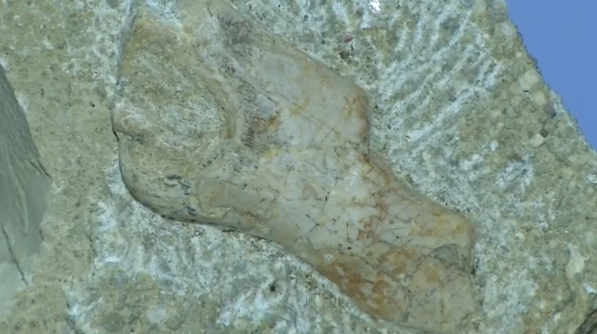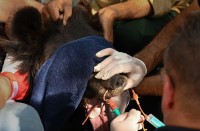
KRASIEJOW, Poland (Reuters) — Polish scientists say they have discovered the world’s oldest preserved fossils of blood vessels and fragments of fossilized animal proteins inside 240 million-year-old bones.
The discovery was made by a joint team of scientists from the University of Silesia, Jagiellonian University in Krakow, the Polish Academy of Sciences and a facility promoting the study of prehistoric fossils, the Science and Human Evolution Park in Krasiejow.
Millions of years ago southern Poland was partially covered by a warm sea, allowing reptiles such as Nothosauria and Tanystropheus to live there.
The remains of some of these reptiles were encountered during excavation works by a team of scientists who noticed very well-preserved bone structures in the samples, leading them to believe there might be a dense network of fossilized blood vessels inside, possibly with traces of proteins preserved.
The bone fragments were dissected and sent to the Center for Education and Interdisciplinary Research in Chorzow for spectrometric analysis. This confirmed that the residue found in the sample was indeed organic matter from prehistoric animals and that it had not been contaminated by biological material from a later period of time.
“By using various spectroscopic methods we succeeded in acquiring very interesting information about the chemical structure and molecular remnants of blood vessels in these very, very old fossilized bones,” Professor Jacek Szade from the University of Silesia research center in Chorzow said.
Scientists confirmed that the tested samples contained fragments of the amino acids hydroxyproline and hydroxylysine – typical components of collagen.
“The condition of (the samples) was really fascinating. Fragments of the blood vessels that we found inside of the bones were preserved with their structure intact, so there were individual components and fragments preserved. In addition, protein – of course naturally degraded proteins which are only fragmentary – but among others, we managed to find collagen, one of the most important proteins in the bodies of animals in general, and in vertebrates in particular,” said Dr. Andrzej Boczarowski from the University of Silesia who works at the Krasiejow facility.
“We know that we need to look at the new material. We have new samples which are even more promising and which will open further possibilities for understanding what is preserved in the fossils and the way of life and appearance of these creatures,” he added.
The world’s oldest protein fragments of fossilized soft tissue to date were discovered by American scientists, and dated back 80 million years.







